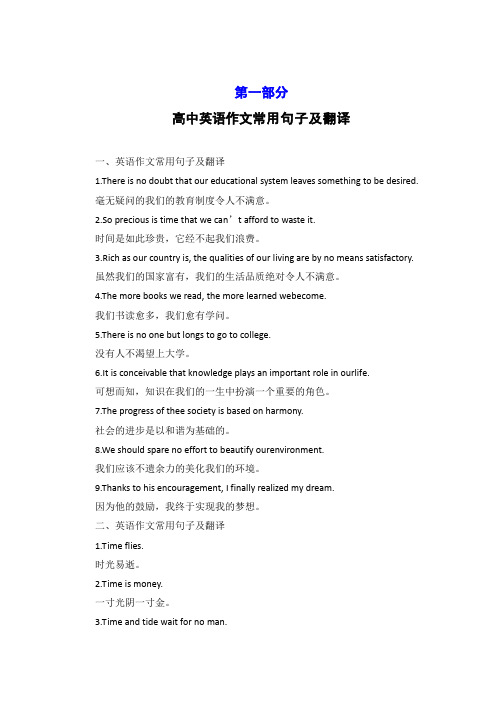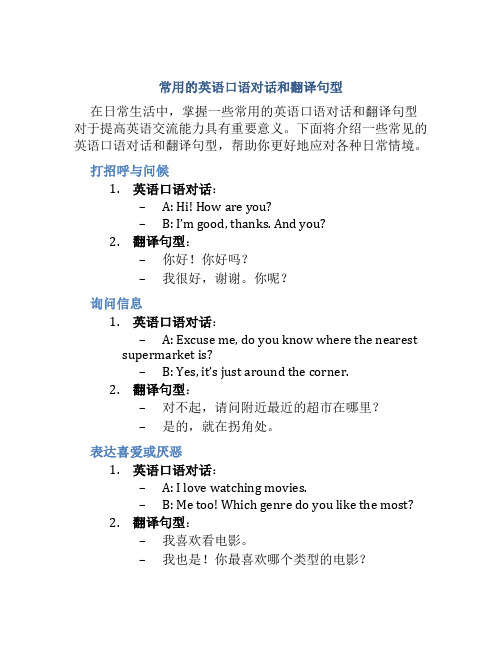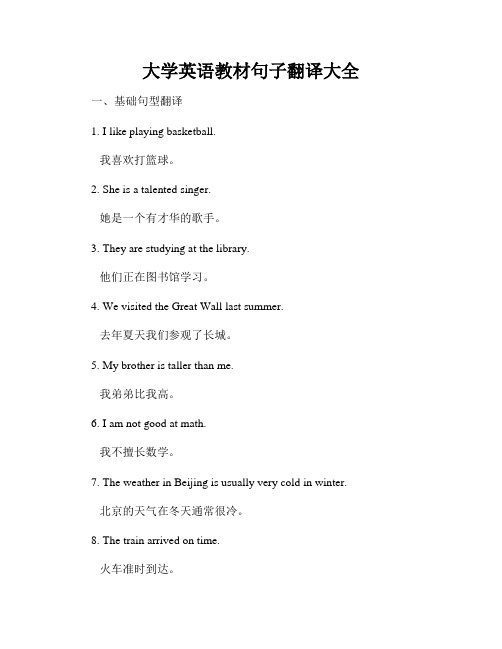英语常用句型翻译
60句英语口语常用句型带翻译

60句英语口语常用句型带翻译"What do you think?" - 你认为呢?"I'll take care of it." - 我会处理好的。
"I'm looking forward to it." - 我期待着。
"I'm on my way." - 我在路上。
"I'll get back to you." - 我会回复你的。
"I'm not ready yet." - 我还没准备好。
"I'm in a hurry." - 我在匆忙。
"I'm starving." - 我饿极了。
"I'm exhausted." - 我累极了。
"I'm proud of you." - 我为你感到骄傲。
"I'm in trouble." - 我有麻烦了。
"I'm not feeling well." - 我身体不舒服。
"I'm sorry to hear that." - 很遗憾听到这个。
"I'm glad to hear that." - 很高兴听到这个。
"I'm not interested." - 我不感兴趣。
"I'm curious." - 我很好奇。
"I'm surprised." - 我很惊讶。
"I'm nervous." - 我有点紧张。
"I'm happy." - 我很高兴。
英语翻译常用句型(加精)

英语翻译常考句型详解1.It is not that…but that… 这不是说…,而是说…「例文」It is not that the scales in the one case, and the balance in the other, differ in the principles of their construction or manner of working; but that the latter is much finer apparatus and of couse much more accurate in its measurement than the former.「译文」这并不是说在一种情况下所使用的磅秤和在另一种情况下所使用的天平在构造原理上或工作方式上存在差别,而是说与前者相比,后者是一种更精密得多的装置,因而在计量上必然更加准确。
2.nothing else than 完全是,实在是「例文」What the man said was nothing else than nonsense.「译文」那个人讲的话完全是一派胡言。
3.as引导的特殊状语从句,翻译时做定语从句处理。
「例文」We hope the measures to control prices, as they have been taken by the government, will succeed.「译文」我们希望,政府已经采取的控制物价的措施将取得成功。
4.名词+or+名词结构中,or后的名词是同位语,应译为即…;或者称….「例文」Moreover, technology includes techniques , or ways to do things , as well as the manchines that may or may not be necessary to apply them.「译文」再者,除机器外技术还包括技艺,即制作方法,而运用这些记忆并不一定都需要机器。
高考英语作文常用句子及翻译及高级句型【40个】

第一部分高中英语作文常用句子及翻译一、英语作文常用句子及翻译1.There is no doubt that our educational system leaves something to be desired. 毫无疑问的我们的教育制度令人不满意。
2.So precious is time that we can’t afford to waste it.时间是如此珍贵,它经不起我们浪费。
3.Rich as our country is, the qualities of our living are by no means satisfactory. 虽然我们的国家富有,我们的生活品质绝对令人不满意。
4.The more books we read, the more learned webecome.我们书读愈多,我们愈有学问。
5.There is no one but longs to go to college.没有人不渴望上大学。
6.It is conceivable that knowledge plays an important role in ourlife.可想而知,知识在我们的一生中扮演一个重要的角色。
7.The progress of thee society is based on harmony.社会的进步是以和谐为基础的。
8.We should spare no effort to beautify ourenvironment.我们应该不遗余力的美化我们的环境。
9.Thanks to his encouragement, I finally realized my dream.因为他的鼓励,我终于实现我的梦想。
二、英语作文常用句子及翻译1.Time flies.时光易逝。
2.Time is money.一寸光阴一寸金。
3.Time and tide wait for no man.岁月无情;岁月易逝;岁月不待人。
小学英语句型大全汇总翻译

小学英语句型大全汇总翻译一、问候和自我介绍1. Hello! 你好!2. Hi! 嗨!3. Good morning/afternoon/evening! 早上/下午/晚上好!4. How are you? 你好吗?5. I'm fine, thank you. 我很好,谢谢。
6. What's your name? 你叫什么名字?7. My name is (name). 我叫(名字)。
8. Nice to meet you! 很高兴认识你!二、询问与回答1. What is this? 这是什么?2. This is a (object). 这是一个(物品)。
3. What color is it? 它是什么颜色的?4. It is (color). 它是(颜色)的。
5. Is this a (object)? 这是一个(物品)吗?6. Yes, it is. 是的,是这样的。
7. No, it isn't. 不,不是这样的。
8. Are you (age) years old? 你(年龄)岁了吗?9. Yes, I am. 是的,我是(年龄)岁了。
10. No, I'm not. 不,我不是。
三、简单对话1. Can you help me? 你能帮助我吗?2. Yes, what do you need? 是的,你需要什么?3. I need (object). 我需要(物品)。
4. Here you are. 给你。
5. Thank you! 谢谢!6. You're welcome! 不客气!7. Where are you from? 你来自哪里?8. I am from (country). 我来自(国家)。
9. What is your favorite food? 你最喜欢的食物是什么?10. My favorite food is (food). 我最喜欢的食物是(食物)。
常用的英语口语对话和翻译句型

常用的英语口语对话和翻译句型在日常生活中,掌握一些常用的英语口语对话和翻译句型对于提高英语交流能力具有重要意义。
下面将介绍一些常见的英语口语对话和翻译句型,帮助你更好地应对各种日常情境。
打招呼与问候1.英语口语对话:–A: Hi! How are you?–B: I’m good, thanks. And you?2.翻译句型:–你好!你好吗?–我很好,谢谢。
你呢?询问信息1.英语口语对话:–A: Excuse me, do you know where the nearest supermarket is?–B: Yes, it’s just around the corner.2.翻译句型:–对不起,请问附近最近的超市在哪里?–是的,就在拐角处。
表达喜爱或厌恶1.英语口语对话:–A: I love watching movies.–B: Me too! Which genre do you like the most?2.翻译句型:–我喜欢看电影。
–我也是!你最喜欢哪个类型的电影?道歉与原谅1.英语口语对话:–A: I’m sorry for being late.–B: That’s okay. Don’t worry about it.2.翻译句型:–对不起,我迟到了。
–没关系,别担心。
谈论天气1.英语口语对话:–A: It’s such a nice day today, isn’t it?–B: Yes, the weather is perfect for a picnic.2.翻译句型:–今天天气真好,不是吗?–是的,天气正适合野餐。
咨询建议1.英语口语对话:–A: Can you give me some advice on how to improve my English?–B: Sure, practice speaking English every day.2.翻译句型:–你能给我一些建议,如何提高我的英语吗?–当然,每天练习说英语。
大学英语教材句子翻译大全

大学英语教材句子翻译大全一、基础句型翻译1. I like playing basketball.我喜欢打篮球。
2. She is a talented singer.她是一个有才华的歌手。
3. They are studying at the library.他们正在图书馆学习。
4. We visited the Great Wall last summer.去年夏天我们参观了长城。
5. My brother is taller than me.我弟弟比我高。
6. I am not good at math.我不擅长数学。
7. The weather in Beijing is usually very cold in winter.北京的天气在冬天通常很冷。
8. The train arrived on time.火车准时到达。
9. She has a beautiful voice.她有一副美妙的嗓音。
10. We had a wonderful time at the party last night.昨晚在派对上我们度过了美好的时光。
二、日常对话翻译1. A: Good morning! How are you today?早上好!你今天好吗?B: I'm good, thank you. How about you?我很好,谢谢你。
你呢?2. A: Excuse me, where is the nearest post office?打扰一下,最近的邮局在哪里?B: Go straight ahead and turn left at the corner. It's just across the street.直走然后在拐角处左转,就在街对面。
3. A: What time is the movie?电影几点开始?B: The movie starts at 7:30 p.m.电影晚上7点半开始。
英语高考常用句型翻译
高中英语常用50句句型翻译1、你没有必要提前预定音乐会的票(need n.)There is no need for you to book the ticket for the concert in advance.2、在专家面前班门弄斧是没有好处的(good n. show)It is no good showing off in the presence of so many experts.3、如果你不能集中精神学习,熬夜是没有用的(use)It is no use staying up late if you can’t focus your attention on your study.4、抱怨交通状况是浪费时间(waste)It’s a waste of time making complaints about the transportation system.5、我觉得你有必要在应聘之前接受一些训练(it)I find it necessary for you to have some training before you apply for a new job.6、我突然想起来我忘记提醒班长集合的时间了(occur)It suddenly occurred to me that i forgot to remind the monitor of the gathering time.7、似乎John对於赢得胜利没有什麽信心,你最好对他说些鼓励的话It seems that John is not very confident of winning and you’d better say a few encouraging words to him.8、第一眼见到她,我就忍不住爱上她了(the first time)The first time i saw her, i couldn’t help falling in love with her.9、你在阅读上花时间越多,取得进步越大The more time you spend in reading, the more rapid progress you will make.10、他获得成功的原因是他从不丧失信心,从不半途而废(halfway)The reason why he achieved success was that he never lost heart and gave up halfway.11、重要的不是你说些什麽而是你如何演讲(matter)What matters is not what’s in your speech but how you deliver your speech.12、再努力一下,你就能成功(effort)Make another effort, and you’ll succeed.13、尽管教学经验不足,他总是全力以赴的满足学生的需求(spare)In spite of the fact that he lacks teaching experience, he spares no effort to meet the demand of his student.14、不可否认,他的勇气和坚持为他赢得了很高的声誉(deny)There is no denying that his courage and perseverance won him great reputation.15、毋庸置疑,这场事故应该怪司机(doubt)There is no doubt that the driver is to blame for the accident.16、吹嘘你能跑多快没意思(point)There is no point boasting about how fast you can run.17、过不了多久这位老人就能从疾病中痊愈(before)It wo n’t be long before the old man recovers from his illness.18、如果你能联系上那家电脑公司我将不胜感激(appreciate)I’d appreciate it very much if you could make contact with the computer company.19、据说缺席此次会议的人数达到了100人(add)It’s said that the number of people who are absent from the meeting adds up to 100.20、有志者,事竟成(where)Where there is a will, there is a way.21、俗话说,值得一做的事就值得做好(worth)As an old saying goes, what is worth doing is worth doing well.22、有消息传出,这位着名的女演员(word)Word came that the famous actress was accused of murder.23、似乎没有必要再等,很有可能他们不会出现了(need n. chances)There seems no need to wait any more and chances are that they won’t turn up.24、这个计划是否能顺利实行还有待观察(remain)It remains to be seen whether the plan can be carried out smoothly.25、令我们最吃惊的是它能在这麽短的时间内适应新的环境(adapt)What surprised me most was that he could adapt himself to the new surroundings during such a short time.26、是你经过自信观察得出结论的时候了(high time)It’s (about/high) time for you to draw/form/make/arrive at a conclusion after careful observation.27、她刚下火车我就发现她把笔记本电脑落在座位上了(Hardly)Hardly had she got off the train when i found that she left her laptop on the chair.28、难怪他不饿,他整天吃糖(wonder)It’s no wonder that he is not hungry, he has been eating sweets all day.29、直到他被授予了诺贝尔奖和平奖,人们才知道他的名字(Not)Not until he was rewarded the Nobel Peace Prize did people know his name.30、正是因为这场死亡十人的可怕的交通事故,这条路被封了数小时(It)It was because of the terrible accident involving 10 people that the road was closed for hours. 31、只有停电的时候我们才会意识到电的重要(Only)Only when there is a power cut can we realize how important electricity is.32、谈到物理,我一片茫然(come to)When it comes to physics, I’m completely at sea.33、人们认为政府理所当然应该采取行动阻断疾病的传播(It)It is taken for granted that the government should take action to prevent the disease from spreading.34、众所周知,很多因素促成了他在科学研究上的成就(contribute)As is known to all that many factors contributed to his great achievement in scientific research.It is known to all that many factors contributed to his great achievement in scientific research.35、实现登月之梦花了人类很多年(It)It takes man many years to realize the dream of landing on the moon.36、有可能老师会采纳学生会提出的建议(likely)It’s likely that the teacher will take/adopt the advice put forward by the Students’ Union.The teacher is likely to take/adopt the advice put forward by the Students’ Union.37、他出国已经五年了(since)It is 5 years since he went abroad.38、教授如此专注于实验,没有察觉到变化多端的天气(absorb)The professor was so absorbed in the experiment that he was not aware of the changing weather.39、一定要把安全守则牢记心中(sure)Be sure to keep the safety rules in mind.40、他退休後肯定会把公司转交给他的儿子(certain)It is certain that he’ll hand over his company to his son after retirement.41、有种日益发展的趋势,人们在网上购物而不是去商场(instead)There is a growing trend that people shop online instead of going to the department stores. 42、阅读对於头脑就像事物对於身体(what)Reading is to the mind what food is to the body.43、你同不同意这个计划不重要(make difference)It makes no difference whether you agree to the plan or not.44、我们是否要推迟运动会取决於天气(It)It all depends on the weather whether we’ll put off the sports meeting.45、这位老人把每天进行的一小时体育锻炼作为一项规定(it)The old man makes it a rule to do an hour’s physical exercise every day.46、请确定你在预定的日期前完成这项工作(sure)Make sure that you finish the task before the scheduled date.47、你和新同事相处不可能费力(difficulty)It is impossible for you to have any difficulty in getting along with your new colleagues.48、他非常高尚把一生都奉献给帮助聋儿(It)It is noble of her to devote her life to helping the deaf children.49、你最好留出足够的钱来支付额外的开销(set aside)You’d better set aside enough money to pay for the extra expense.It’s better for you to set aside enough money to pay for the extra expense.。
英语翻译经典句型
英语翻译经典句型1.地球的作用像一块大磁铁。
The earth acts like a big magnet.2.造成事故的原因还不清楚。
It’s not clear what caused the accident.3.这个句子形式是被动的,而意思是主动的。
This sentence is passive in form but active in sense.4.这个调皮的男孩很不老实,他的借口一点儿也站不住脚.This naughty boy is far from honest and his excuse is pretty thin.5.在鸡尾酒会上人们常常可以看出大人物与无名小卒来。
那些迟到的就是大人物。
You can always tell the somebodies from the nobodies at a cocktail party. The somebodies always come late.1.他待人处世,八面玲珑.He was smooth and agreeable.2.她和你的年龄大体相同。
She is of about the same age as you.3.没有人相信她已年过古稀.No one believes that she is already over seventy years old.4.太阳到地球的距离大得不可想象.The distance from the sun to the earth is too great to imagine.5.想去博物馆的人必须在早上7:50到大门口集合。
Those who wish to go to the meseum must be at the gate by 7:50 a.m1.金子的颜色与黄铜相似。
Gold is similar in colour to brass.2.他是一个见异思迁的人。
翻译常用句型
翻译常用句型1. How are you doing? 你好吗?2. Can you help me? 你能帮我吗?3. What's your name? 你叫什么名字?4. Where are you from? 你从哪里来?5. How old are you? 你多大了?6. Can I have a glass of water, please? 我可以来杯水吗?7. What time is it? 几点了?8. I love you. 我爱你。
9. Thank you. 谢谢你。
10. How much does it cost? 这个多少钱?11. Where is the restroom? 厕所在哪里?12. I'm sorry. 对不起。
13. Can you speak English? 你会说英语吗?14. Where can I find a taxi? 我在哪里可以找到出租车?15. What's the weather like today? 今天天气怎么样?16. I'm hungry. 我肚子饿了。
17. What's your favorite color? 你最喜欢的颜色是什么?18. How do you say this in English? 这个用英语怎么说?19. Where do you live? 你住在哪里?20. I don't understand. 我不明白。
21. Can you repeat that, please? 你能重复一遍吗?22. I'm tired. 我累了。
23. What's your occupation? 你的职业是什么?24. What's your favorite food? 你最喜欢的食物是什么?25. How was your day? 你今天过得怎么样?26. Can you recommend a good restaurant? 你能推荐一家好的餐厅吗?27. Where is the nearest bus stop? 最近的公交车站在哪里?28. Do you have any siblings? 你有兄弟姐妹吗?29. What's your phone number? 你的电话号码是多少?30. Can you lend me some money? 你能借我一些钱吗?31. What's your favorite movie? 你最喜欢的电影是什么?32. What's your favorite book? 你最喜欢的书是什么?33. How do you get to school? 你怎么去学校?34. What's your favorite sport? 你最喜欢的运动是什么?35. Can I have the bill, please? 能给我帐单吗?36. What's your favorite music genre? 你最喜欢的音乐类型是什么?37. How do you spell your name? 你的名字怎么拼?38. What's your favorite animal? 你最喜欢的动物是什么?39. Can I take a photo with you? 我可以和你合影吗?40. Where can I buy souvenirs? 我在哪里可以买纪念品?41. What's the capital of your country? 你的国家的首都是什么?42. Can you play a musical instrument? 你会弹奏乐器吗?43. What's your favorite hobby? 你最喜欢的爱好是什么?44. What's your favorite season? 你最喜欢的季节是什么?45. Can you teach me how to do that? 你能教我如何做吗?46. What's your favorite holiday? 你最喜欢的假期是什么?47. Can I try it on? 我可以试穿吗?48. What's your favorite song? 你最喜欢的歌曲是什么?49. How do you say "hello" in your language? 你的语言中怎么说“你好”?50. What's your favorite drink? 你最喜欢的饮料是什么?。
初中英语常考句型翻译
初中英语常考句型翻译(一)1.对于青少年来说,学习如何交友是很重要的。
It’s important for teenagers to learn how to make friends.虽然雨下得正大,但是对于他来说,看来不跑完最后的200米是不可能的。
Although it is raining heavily, it looks that it’s impossible for him not to finish the last 200 meters.吃更多的蔬菜是有好处的。
ood to eat more vegetables.It’s g对于我们来说拥有充足的睡眠是重要的。
It’s important for us to have enough sleep.对于我们来说保持环境清洁是重要的。
It’s important for us to keep the environment clean.嘲笑残疾人是不礼貌的。
It’s impolite to laugh at disabled people.进行更多的锻炼对你的健康来说是有益的。
It’s good for your health to do more exercise.在太阳下读书对眼睛是有害的。
It’s bad for eyes to read in the sun.2.很抱歉,我的自行车坏了。
请再等我五分钟。
I’m sorry, there is something wrong with my bike. Please wait for me five moreminutes.我的电视机坏了,所以我不能看比赛了。
There is something wrong with my TV, so I can’t watch the match.我的计算机坏了。
你能帮助我修理一下吗?There is something wrong with my computer. Could you help me mend it?这台机器坏了。
- 1、下载文档前请自行甄别文档内容的完整性,平台不提供额外的编辑、内容补充、找答案等附加服务。
- 2、"仅部分预览"的文档,不可在线预览部分如存在完整性等问题,可反馈申请退款(可完整预览的文档不适用该条件!)。
- 3、如文档侵犯您的权益,请联系客服反馈,我们会尽快为您处理(人工客服工作时间:9:00-18:30)。
The English language has its peculiarities in negation. Of course, English-speaking people have their own way of thinking in the negation and of expressing negative implications, quite different from ours. What is affirmative in form in English may often mean something negative in Chinese, and vice versa. Whether sentences in English are to be turned to negative or affirmative requires careful consideration.
英语常用句型翻译
常用句式的翻译方法 1、强调句 2、否定句 3、虚拟语气 4、成语习语 5、其它动词形式
1、强调句的译法
英语的句子可利用不同的语法手法 来强调其中的某个成分, 从而构成 了强调句。强调的方法有三种。
(1)用do来强调的语句
可把 do 译为 “确实”、“一定” 、“必须” 等词, 以加强语气。
a. not every(=some “不是每个” )
1. Every electric motor here is not new.
这儿的电动机并不是每台都是新的。 2. Every student can not do the
experiment well. 并非每个学生都能做好实验。
(1)、全部否定(Full Negation)
全部否定指意义上的彻底否定, 无任 何肯定余地。
全部否定句可以由 never, no, not, none, nobody,
nothing, neither…nor 等否定词 构成。 这类句子可以直接译成全部否 定句。
Examples:
1. Never touch a switch when your hands are wet.
d. 时间副词置于句首的句子
1. Now comes your turn. 现在轮到你了。
2. Then began our new lesson. 于是我们开始上新课。
e. 语气副词置于句首的句子
1. No defects did we find in these parts.
在这些零件里,我们没发现什么瑕疵 。
a. 强调主语
1. It is shallow people who judge by appearances.
浅薄之人,以貌取人。
2. It is not helps but obstacles that makes a man.
使人成才的, 不是助力而是阻力。 (或)造就一个人, 不是扶助他,而
是磨难他。
b. 强调宾语
1. It was John with whom he first came into contact.
他首先是与约翰取得联系的。
2. It was a bouquet of roses that was left to us.
留给我们的是一束玫瑰。
3. It is this molecular motion that we call heat.
Examples: 1. These bacteria are too small
to be seen, but they do exist. 这些细菌小得看不见, 但它们确实存
在。
2. This reaction did take place. 这种反应确实发生了。
3. They do represent extreme cases.
none other than, by no means, not in the least, etc.
1.The new arrival was none other than the president.
2. He is by no means stupid. 3. He is not in the least angry with
正是这种分子运动我们称之为热。
c. 强调状语
1. It was not until evening that we learned the unhappy news.
直到晚上,我们才得知这不幸的消息 。
2. It was here that he told me what had happened two years ago.
b. not all(=some “不全是”)
1. All the students are not diligent.
不是所有的学生都用功。 2. I can not remember all these
formulas. 这些公式我并不全都记得。
c. not both(=one “两个不都”)
me. 刚进来的人不是别人正是总统。 他一点都不笨。 他一点都没生我的气。
(2)部分否定 (Partial Negation)
部分否定指不完全否定, 其中的否定 因素也带有一定程度的不否定因素。
部分否定的概念是由几种不定代词之 一与“ not ” 搭配而成。
部分否定在结构上不易判明, 翻译时 必须特别注意。
就是在这里他向我讲述了两年前发生 的事情。
3. It is from radio that the subject of electronics was born, which brought such great changes to the technology of today.
电子这门学科正是从无线电产生的, 它为现代技术带来了如此巨大的变化。
Examples:
1. Without substance, there could be no world.
没有物质就没有世界。 2. He is not incompetent for
learning foreign language well. 他不是没有能力学好外语。
3. There is no rule that has no exceptions.
它们确实代表特殊情况。
(2)It (was)…that(which,who)
强调的句型
用强调句型
“It is(was)…that(which,who)…” 可以强调主语、宾语、状语。对于强调 句, 在译文里可用“正是”一类的字 眼来强调有关成分。整个句子应当顺译 , 但在强调宾语时也可以倒译。
铜的熔点没有铁的熔点高。
从句为倒装语序,省略is 后为自然语 序。
2、否定句的译法
英语的否定形式是一个常见而又比较 复杂的问题, 使用非常灵活、微妙, 被认为是英语的特点之一。
在表达否定概念时, 英语在用词、语 法和逻辑等方面与汉语有很大不同。
因此才翻译英语否定句型时, 必须细 心揣摩,真正彻底理解其意义及否定重 点,然后根据汉语的习惯进行翻译。
2. No transistor in the box is out of order.
3. None of these substances are good conductors.
1、严禁用湿手触碰开关。 2、盒子里的晶体管没有一个是坏的。 3、这些物质都不是良导体。
Phrases used in negation:
不是许多东西在刚发现时就是有用的 。
2. Not many of us can understand this idea.
并非我们中的许多人都能理解这一观 点。
e. Not always(=sometimes “不总是”, “有时” )
Friction is not always useless, in certain cases it becomes a helpful necessity.
2. Scarcely did they speak about the difficulties in their work.
他们很少谈到自己工作中的困难。
此外, 在比较状语从句或方式状语从 句采用倒装语序的强调句中,译成汉语 时和原文使用的自然语序相同。
如:
The melting point of copper is not so high as (is) that of iron.
任何规则都有例外。
4. It is not rarely that he gets angry. 他经常发脾气。
5. Those two girls never chat together without teasing each other.
那两个女孩在一起聊天总是互相逗乐 。
(3)利用倒装结构表示强调
英语句子的倒装结构主要出于上下文或预期 上的需要,以使说话或文章中心突出有力。 谚语一般不用倒装结构, 所以英译汉时常需 作适当的改变。用倒装语序构成的强调句在 翻译时要根据情况作不同的处理。但不是所 有的倒装语序都一定要译成强调句。
翻译这类强调句时,一般采用顺译法即可表 到强调意味, 有时也用语气词“就”、“也 ”等字来表示强调。
1. Both of the substances do not dissolve in water.
不是两种物质都溶于水。 2. Both of the answers are not
right. 两种答案并非都不对。
d. not many(=a few (“不多 ”, “少数几个”)
1. Not many of the things are of use in form in which they are found.
